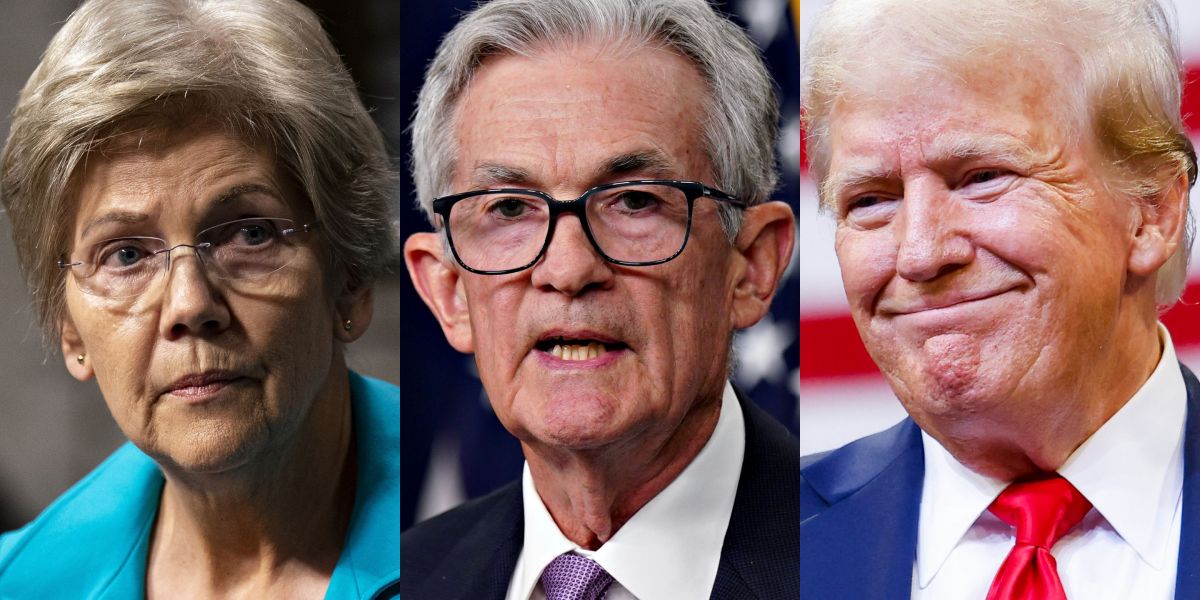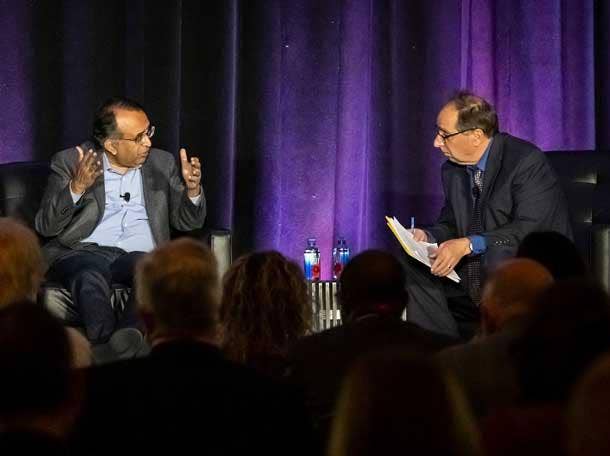Trump's Scathing Criticism Of Jerome Powell: A Call For Dismissal

Table of Contents
The Roots of Trump's Discontent: Economic Policy Differences and Their Impact
Trump's frustration with Powell originated from differing views on monetary policy and its impact on economic growth. The core of their conflict revolved around interest rates and the Federal Reserve's approach to managing inflation.
Trump's Focus on Low Interest Rates and Economic Growth
Trump consistently advocated for low interest rates to stimulate economic growth, believing it crucial for achieving his ambitious economic goals. His desired outcomes included:
- Rapid GDP growth exceeding 3% annually.
- Significant job creation and reduced unemployment.
- Increased business investment and consumer spending.
However, maintaining persistently low interest rates carries inherent risks, such as:
- Increased inflation, potentially eroding purchasing power.
- Formation of asset bubbles in the stock market and real estate, leading to eventual corrections.
- Weakening of the US dollar, impacting international trade.
Powell's Stance on Monetary Policy and Independence of the Federal Reserve
Powell, in contrast, prioritized maintaining price stability and managing inflation, even if it meant slower economic growth in the short term. His approach emphasized:
- Data-driven decision-making, adjusting interest rates based on economic indicators.
- A commitment to the Federal Reserve's independence from political influence.
- A focus on long-term economic stability, rather than short-term gains.
Powell consistently defended the Fed's independence, arguing against political interference in monetary policy decisions.
Analyzing the Discrepancy: Contrasting Trump's and Powell's Economic Philosophies
Trump’s approach leaned towards a more interventionist, growth-focused economic philosophy, prioritizing short-term gains. Powell, on the other hand, championed a more cautious, stability-oriented approach, emphasizing the long-term health of the economy. This fundamental difference in economic philosophy fueled the tension and resulted in frequent public clashes. Trump’s statements often criticized Powell for raising interest rates, viewing it as an impediment to his economic agenda. For example, Trump publicly stated (exact quote needed and cited) his displeasure with rate hikes on numerous occasions, highlighting the stark contrast in their approaches.
Trump's Public Outbursts and Their Consequences
Trump's criticism of Powell wasn't confined to private meetings; it frequently played out in public, through tweets, press conferences, and interviews.
A Timeline of Trump's Criticism: From Tweets to Public Statements
Trump's attacks on Powell were consistent and escalated over time. A timeline would include specific dates and examples of his criticisms, such as:
- [Date]: Tweet criticizing Powell's interest rate decision. (Include quote if available)
- [Date]: Public statement blaming Powell for slow economic growth. (Include quote if available)
- [Date]: Interview expressing dissatisfaction with Powell's performance. (Include quote if available)
This timeline would showcase the intensity and frequency of Trump’s attacks.
The Impact on Market Volatility and Investor Confidence
Trump's public criticism significantly impacted market volatility and investor confidence. The uncertainty surrounding the Federal Reserve's independence and potential political interference created uncertainty, leading to:
- Increased market fluctuations.
- Reduced investor confidence in the stability of the US economy.
- Potential flight of capital from the US markets. (Statistics needed to support this claim)
The Broader Political Implications of Trump's Actions
Trump's actions raised concerns about the independence of the Federal Reserve and the separation of powers. The potential for political influence on monetary policy could:
- Undermine the credibility of the Federal Reserve.
- Compromise the stability of the US financial system.
- Set a dangerous precedent for future administrations.
The Debate Surrounding Powell's Dismissal: Arguments For and Against
The calls for Powell's dismissal sparked a vigorous debate, with arguments presented on both sides.
Arguments for Dismissal: Trump's Perspective and Supporters' Views
Supporters of Powell's dismissal, largely aligned with Trump's viewpoints, argued that:
- Powell's policies were hindering economic growth.
- His approach was too cautious and inflexible.
- A change in leadership was necessary to achieve Trump's economic goals.
These arguments often emphasized the perceived short-term economic benefits of lower interest rates, potentially overlooking the longer-term risks.
Arguments Against Dismissal: Concerns Regarding the Fed's Independence
Opponents of Powell's dismissal stressed the critical importance of maintaining the Federal Reserve's independence from political influence:
- Dismissing Powell would set a dangerous precedent, potentially jeopardizing the Fed’s ability to make unbiased decisions based on economic data, not political pressures.
- Politicizing the Federal Reserve could lead to erratic monetary policy and instability in the financial markets.
- Experts warned that such a move would severely damage the credibility of the US central bank globally.
Conclusion: Assessing the Legacy of Trump's Criticism and Calls for Jerome Powell's Dismissal
Trump's criticism of Jerome Powell represents a significant chapter in the history of US economic policy and the relationship between the executive branch and the Federal Reserve. The conflict highlighted fundamental disagreements over economic philosophy, the importance of the Fed's independence, and the potential consequences of politicizing monetary policy. The debate surrounding Powell's potential dismissal continues to raise vital questions about the balance between political objectives and economic stability. The key takeaway is the critical need to safeguard the independence of the Federal Reserve to ensure the long-term health and stability of the US economy.
We encourage you to share your thoughts on Trump's criticism of Jerome Powell and its implications. Further research and informed discussion are crucial for understanding the complex interplay between politics and monetary policy. Continue the conversation – what are your thoughts on the impact of Trump's criticism of Jerome Powell?

Featured Posts
-
 1 050 V Mware Price Hike At And Ts Concerns Over Broadcoms Acquisition
Apr 23, 2025
1 050 V Mware Price Hike At And Ts Concerns Over Broadcoms Acquisition
Apr 23, 2025 -
 Best And Worst Uk Diy Stores A Consumer Report
Apr 23, 2025
Best And Worst Uk Diy Stores A Consumer Report
Apr 23, 2025 -
 Yankees Smash Record With 9 Home Runs Judges 3 Blast Fuels Victory
Apr 23, 2025
Yankees Smash Record With 9 Home Runs Judges 3 Blast Fuels Victory
Apr 23, 2025 -
 Michael Lorenzens Pitching Style And Performance Analysis
Apr 23, 2025
Michael Lorenzens Pitching Style And Performance Analysis
Apr 23, 2025 -
 1 0 Again Reds Make Mlb History With Repeated Losses
Apr 23, 2025
1 0 Again Reds Make Mlb History With Repeated Losses
Apr 23, 2025
Latest Posts
-
 Market Volatility In Pakistan Stock Exchange Portal Experiences Outage
May 09, 2025
Market Volatility In Pakistan Stock Exchange Portal Experiences Outage
May 09, 2025 -
 Pakistan Stock Exchange Down Understanding The Current Market Volatility
May 09, 2025
Pakistan Stock Exchange Down Understanding The Current Market Volatility
May 09, 2025 -
 Pakistani Market Instability Stock Exchange Portal Downtime
May 09, 2025
Pakistani Market Instability Stock Exchange Portal Downtime
May 09, 2025 -
 Pakistan Stock Exchange Portal Down Volatility And Geopolitical Tensions
May 09, 2025
Pakistan Stock Exchange Portal Down Volatility And Geopolitical Tensions
May 09, 2025 -
 Boosting Capital Market Cooperation Pakistan Sri Lanka And Bangladesh Collaborate
May 09, 2025
Boosting Capital Market Cooperation Pakistan Sri Lanka And Bangladesh Collaborate
May 09, 2025
